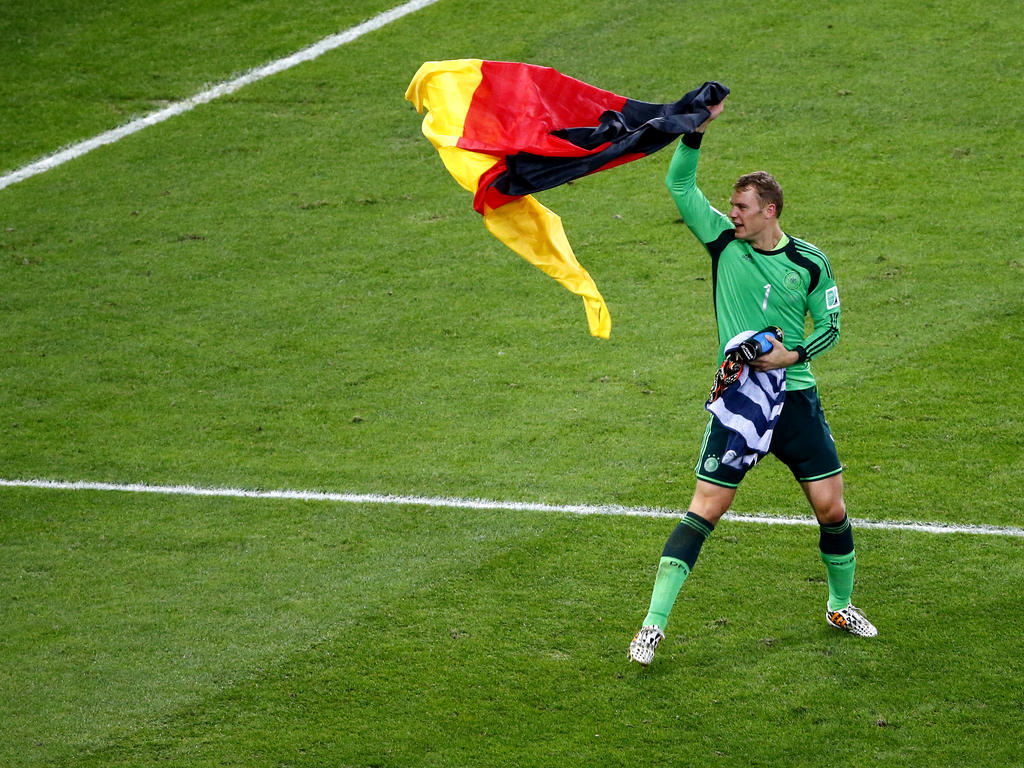World Cup win inspires joy but not swagger in resurgent Germany

Germany, Europe's top economy and increasingly its dominant political power, is now also the world football champion, but its neighbours should not fear a resurgence in chauvinism, commentators said Monday.
To some, crowds of ecstatic German fans waving the black-red-gold national flag and loudly singing "Super Deutschland" are still a jarring sight, given the country's deeply troubled history.
The New York Times, reporting on Berlin celebrations after Sunday's 1-0 World Cup final win against Argentina, wrote that the victory "symbolised, at least to fans, not just the country's dominance of Europe, but its global prominence".
Others argue that it is just football, observing that the sport is fuelled by patriotic fervour everywhere, and that Germany has every right to celebrate its national heroes.
The turning point for a country, where expressions of patriotism were long almost taboo, came in 2006 when an unusually sun-kissed Germany hosted a World Cup and few minded that crowds sang the national anthem in packed stadiums.
The Koelner Stadt-Anzeiger newspaper in Cologne noted that Germany has become more like other countries in its expressions of national joy, commenting that "the tensions of the past have finally eased, but this hasn't been followed by a new nationalism, rather a new openness to the world".
Gero Neugebauer, a political scientist in Berlin, quipped that "people now have national flags attached to their cars, but if they fall off, no one stops and turns around to pick them up from the side of the road".
Joerg Forbrig, of the German Marshall Fund think-tank, said that "even if the whole country is celebrating now, we shouldn't read too much into that. Is this a new sign of German might and dominance? To me, that sounds like a little bit too much."
"One of my colleagues asked, 'Does this mean that (German Chancellor Angela) Merkel always wins?' But Germany won the World Cup three times before Frau Merkel became chancellor."
President Joachim Gauck, who was in the Rio stadium with Merkel for the final, said the World Cup win reminded him of West Germany's 1954 defeat of Hungary, widely remembered for the coach's claim that, as a nation, "we are someone again".
Dubbed the "Miracle of Bern", that match, nine years after the end of World War II and the Holocaust, has been described as a turning point for a spiritually and physically shattered nation as it embarked on its "economic miracle".
Hajo Funke, a political scientist, said the difference is that in 1954 Germany was still deeply in denial about the crimes of the Nazi era, and that the football jubilation was marked by "considerable nationalist overtones".
"At the time the thinking was, 'We are now allowed to forget the crimes of National Socialism and the fact that millions took part in them,'" he said, pointing out that Germany only started to seriously reflect on its past much later.
Even Germany's 1990 World Cup win, which came shortly after the fall of the Berlin Wall and just before the country's reunification, carried uncomfortable expressions of nationalism, said Funke, an expert on far-right extremism.
"This time really was different," he said. "A large majority cheered because the football was open, cooperative and driven by team spirit, not out of a sense of nationalism."
Nonetheless, football is never entirely separate from politics in the collective psyche, and especially in media coverage, said Hans Kundnani of the European Council on Foreign Relations.
"Two years ago when the European championships were on, there was one very striking coincidence. Germany was playing against Greece on the very day negotiations were taking place on the euro crisis," Kundnani said.
"After Germany beat Greece, a newspaper headline said 'No-one can stop us now'. There was this sense of triumphalism."
He also pointed out that "Germany tends to look at international politics and the global economy as a kind of sporting event: Merkel incessantly talks about competitiveness, and Germans like to use the word 'Export-Weltmeister' (exports world champion)."
But Kundnani also cautioned against the temptation of reading too much into a sporting victory, which he said especially happens in hindsight if events fit neatly into a broader historical narrative.
"I am not sure what we can say about this World Cup victory," he said. "During the match, I almost sent a tweet saying: 'We are someone again, but who are we?'"






